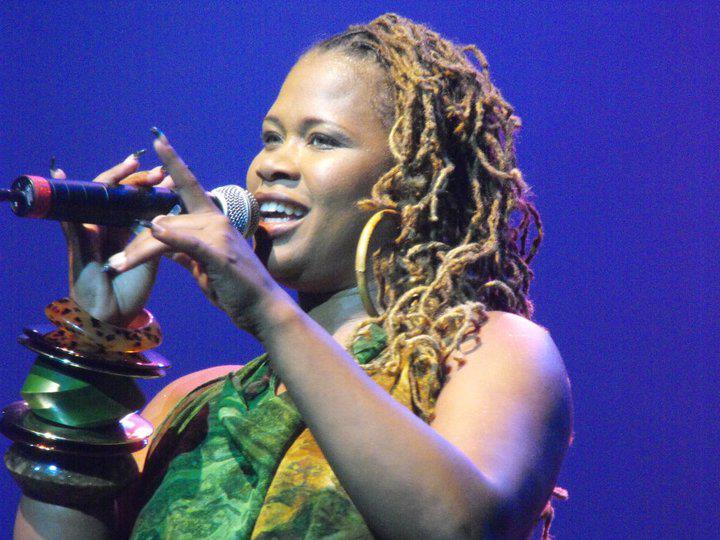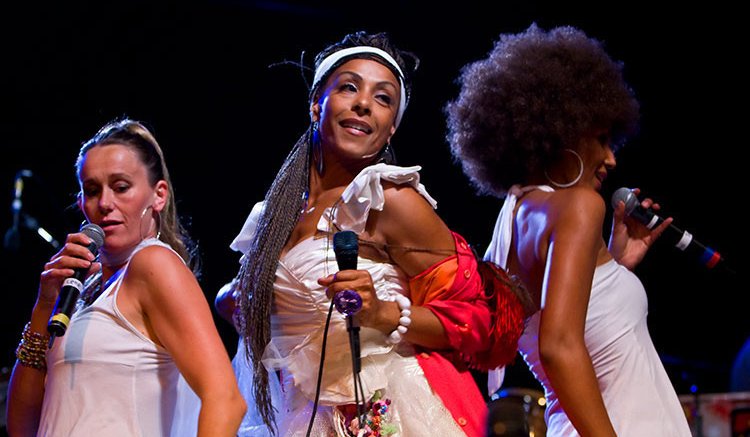|
Afrobeats
Afrobeats, not to be confused with Afrobeat or Afroswing, is an umbrella term to describe popular music from West Africa and the diaspora that initially developed in Ghana, Nigeria, and the UK in the 2000s and 2010s. Afrobeats is less of a style per se, and more of a descriptor for the fusion of sounds flowing out of Ghana and Nigeria. Genres such as hiplife, jùjú music, highlife, azonto music, and naija beats, among others, were amalgamated under the "Afrobeats" umbrella. Afrobeats is primarily produced in Accra, Lagos, and London. Historian and cultural critic Paul Gilroy reflects on the changing London music scene as a result of shifting demographics: We are moving towards an African majority which is diverse both in its cultural habits and in its relationship to colonial and postcolonial governance, so the shift away from Caribbean dominance needs to be placed in that setting. Most of the grime folks are African kids, either the children of migrants or migrants them ... [...More Info...] [...Related Items...] OR: [Wikipedia] [Google] [Baidu] |
Afroswing
Afroswing, also known as Afrobashment, or less commonly Afrobbean or Afrowave, is a genre of music that developed in the UK during the mid-2010s, derivative of dancehall and afrobeats, with influences from trap, British hip hop, R&B, and grime. Commercially, the genre has been very successful, with many afroswing artists making it into the British charts. Characteristics Afroswing is largely defined by its melody rather than a specific tempo. Producer Steel Banglez stated the key elements of afroswing were happy or dark chords that "make you feel a certain way", and that "drum pattern is the most important thing about this whole sound, it's the snare that comes on the third. In hip-hop it comes on the fourth. Coming off the third beat comes from afrobeats." Martin Connor, an expert in vocal melodies and rap analysis, described the characteristics of the genre as being " .technically in 4/4, what you will hear over and over again is this recurring pattern made up of three ... [...More Info...] [...Related Items...] OR: [Wikipedia] [Google] [Baidu] |
Afrobeat
Afrobeat (also known as Afrofunk) is a West African music genre, fusing influences from Nigerian (such as Yoruba) and Ghanaian (such as highlife) music, with American funk, jazz, and soul influences. With a focus on chanted vocals, complex intersecting rhythms, and percussion,Grass, Randall F. "Fela AnikulaThe Art of an Afrobeat Rebel". ''The Drama Review''. MIT Press. 30: 131–148. the style was pioneered in the 1960s by Nigerian multi-instrumentalist and bandleader Fela Kuti, who popularised it both within and outside Nigeria. At the height of his popularity, he was referred to as one of Africa's most "challenging and charismatic music performers." Distinct from Afrobeat is Afrobeats, a combination of sounds originating in West Africa in the 21st century. This takes on diverse influences and is an eclectic combination of genres such as hip hop, house, jùjú, ndombolo, R&B, soca, and dancehall. The two genres, though often conflated, are not the same. History ... [...More Info...] [...Related Items...] OR: [Wikipedia] [Google] [Baidu] |
Gqom
Gqom () (igqomu (), gqom tech, sgubhu, 3-step or G.Q.O.M) is an African electronic dance music genre and subgenre of house music, that emerged in the early 2010s from Durban, South Africa, pioneered and innovated by Record producer, music producers Naked Boyz, Rudeboyz, Sbucardo, Griffit Vigo, Nasty Boyz, DJ Lag, Menzi Shabane, Distruction Boyz and Citizen Boy. Unlike other South African electronic music, traditional gqom is typified by minimal, raw and repetitive sound with heavy bass but without the Four on the floor (music), four-on-the-floor rhythm pattern. Music industry personnel who were pivotal in accelerating the genre's international acclaim in the genre's initial developmental phases included the likes of South African rapper Okmalumkoolkat, Italian record label Gqom Oh owner Nane Kolè, as well as other South Africans, including event curator and public relations liaison Cherish Lala Mankai, Afrotainment record label owner DJ Tira, Babes Wodumo, Mampintsha and Busisw ... [...More Info...] [...Related Items...] OR: [Wikipedia] [Google] [Baidu] |
J Hus
Momodou Lamin Jallow (born 26 October 1996) known professionally as J Hus, is a British rapper and singer who has been credited with pioneering the genre Afroswing. He is currently signed to Black Butter Records. He gained popularity in 2015 following the release of his song "Dem Boy Paigon". J Hus' "Did You See (song), Did You See" became his most successful single at the time, peaking at number nine on the UK Singles Chart and eventually being certified BPI certification, Platinum. In 2017, he released his debut album, ''Common Sense (J Hus album), Common Sense'', which was critically acclaimed—it was named the best UK album of 2017 by Complex (magazine), ''Complex''. The album reached number six on the UK Albums Chart. In June 2018, he was arrested in Stratford and charged with Knife legislation#United Kingdom, carrying a knife in public. Hours after his release from prison in April 2019, he made a surprise appearance on stage at Canadian rapper Drake (musician), Drake's c ... [...More Info...] [...Related Items...] OR: [Wikipedia] [Google] [Baidu] |
Afropop
African popular music (also styled Afropop, Afro-pop, Afro pop or African pop) can be defined as any African music, regardless of genre, that uses Western pop musical instruments, such as the guitar, piano, trumpet, etc.Olabode, O. (2023, January 24)''Afropop shaping the future of global music'' FAB L’Style. Afropop is a genre of music that combines elements from both African traditional music with Western pop music, characterized by the use of African rhythms and melodies, as well as western instrumentation and production techniques. Like African traditional music, Afropop is vast and varied. Most contemporary genres of western popular music build on cross-pollination with traditional African American and African popular music. Many genres in popular music of rock, metal, pop, blues, jazz, salsa, zouk, and rumba derive, of varying degrees, musical traditions from Africa cultured to the Americas, by enslaved Africans. These rhythms and sounds have subsequently been ad ... [...More Info...] [...Related Items...] OR: [Wikipedia] [Google] [Baidu] |
Alté
Alté (locally pronounced as "ahl-teh") is a fusion genre of music that combines elements of afrobeats, dancehall, reggae, hip hop, and alternative R&B. The term was coined in the 2010s by Nigerian music group DRB LasGidi, meaning alternative and "individualistic and non-traditional modes of self-expression" through music and fashion. Characteristics Alté fuses a wide array of musical influences from afrobeats, rap, R&B, soul, dancehall, and others. The term was coined by DRB LasGidi members and was first heard on Boj's 2014 song "Paper"; it was later used to describe left-field styles of music. TeeZee explained about the term saying "Alté is Nigerian lingo for 'alternative' which means freedom of expression essentially through any medium. It has been going on since the 1960s as Nigerians always experimented with music. It became recognized as a style or genre from about 2012 upwards and it broke into the mainstream in 2016 with the rise of its new stars." Its fashion cultu ... [...More Info...] [...Related Items...] OR: [Wikipedia] [Google] [Baidu] |
Fela Kuti
Fela Aníkúlápó Kútì (born Olufela Olusegun Oludotun Ransome-Kuti; 15 October 1938 – 2 August 1997) was a Nigerians, Nigerian musician and political activist. He is regarded as the principal innovator of Afrobeat, a Nigerian music genre that combines West African music with American funk and jazz. At the height of his popularity, he was referred to as one of Africa's most "challenging and charismatic music performers". AllMusic described him as "a musical and sociopolitical voice" of international significance. Kuti was the son of Nigerian women's rights activist Funmilayo Ransome-Kuti. After early experiences abroad, he and his band Africa '70 (featuring drummer and musical director Tony Allen (musician), Tony Allen) shot to stardom in Nigeria during the 1970s, during which he was an outspoken critic and target of Nigerian military juntas of 1966–1979 and 1983–1999, Nigeria's military juntas. In 1970, he founded the Kalakuta Republic commune, which declared itsel ... [...More Info...] [...Related Items...] OR: [Wikipedia] [Google] [Baidu] |
Fuji Music
Fújì is a genre of Yoruba popular music that emerged in Nigeria in the 1960s. It evolved from the improvisational wéré music also known as ajísari (meaning "waking up for sari", performed to awaken Muslims before dawn during the fasting season of Ramadan. Fuji music was named after the Japanese stratovolcano-mountain, Mount Fuji by Alhaji Sikiru Ayinde Barrister (pioneer of wéré). It features energetic beats, diverse Yoruba rhythms, and call-and-response vocals. Fuji's influence extends into contemporary music, with its hooks and rhythms frequently appearing in Nigerian hip hop. In February 2024, professor and filmmaker Saheed Aderinto released the first episode of The Fuji Documentary titled "Mr. Fuji: Barry Wonder" which chronicles the story of Fuji music creator Sikiru Ayinde Barrister. Etymology Sikiru Ololade Ayinde Balogun Barrister significantly popularized wéré music during the 1950s and 1960s and later coined the term "fuji" for his new innovation ( ... [...More Info...] [...Related Items...] OR: [Wikipedia] [Google] [Baidu] |
Ndombolo
Ndombolo, also known as dombolo, is a genre of dance music originating in the Democratic Republic of the Congo. Derived from soukous in the 1990s, with fast-paced hip-swaying dance rhythms, often accompanied by Beat (music), upbeat, Percussion instrument, percussion-driven music, the style became widespread in the mid-1990s and the subsequent decade, dominating dancefloors in Central Africa, central, East Africa, eastern, and West Africa, western Africa. It inspired Afrobeats, West African popular music, coupé-décalé, Kuduro, and Sub-Saharan African music traditions, East African dance music. Ndombolo customarily features lead vocalists, backup vocalists, guitars, drums, and Synthesizer, synthesized sounds. The lyrics often explore themes of human relations, marriage, courtship, trickery, disappointment, and Politics of the Democratic Republic of the Congo, Congolese sociopolitical culture. Prominent musicians such as Papa Wemba, Dany Engobo, Koffi Olomide, Werrason, Awilo Lo ... [...More Info...] [...Related Items...] OR: [Wikipedia] [Google] [Baidu] |
Soca Music
Soca music, or the "soul of calypso", is a genre of music that originated in Trinidad and Tobago in the 1970s. It is considered an offshoot of Calypso music, calypso, with influences from Afro–Trinidadians and Tobagonians, Afro-Trinidadian and Indo–Trinidadians and Tobagonians, Indo-Trinidadian rhythms. It was created by Ras Shorty I (or Lord Shorty) in an effort to revive traditional calypso, the popularity of which had been declining amongst younger generations in Trinidad due to the rise in popularity of reggae from Jamaica and Soul music, soul and funk from the United States. From the 1980s onward, soca has developed into a range of new styles. Etymology "Soca" is a Blend word, portmanteau of the words "soul" and "calypso". The genre was defined by Lord Shorty as the "Soul of Calypso." The word was originally spelled s-o-k-a-h by Lord Shorty. In a 1979 interview with ''Carnival Magazine,'' Lord Shorty stated that he "came up with the name soca. I invented soca. And I ... [...More Info...] [...Related Items...] OR: [Wikipedia] [Google] [Baidu] |
Afro Fusion
Afro fusion (also spelled afrofusion or afro-fusion) is a Dance style, dance and musical style that emerged between the 1970s and 2000s. In the same way as the dance style, the musical style invokes fusions of various regional and inter-continental musical cultures, such as jazz, Hip hop music, hip hop, kwaito, reggae, Soul music, soul, pop, kwela, blues, Folk music, folk, rock and afrobeat. Term and widespread usage Vincent Mantsoe and Sylvia Glasser are the pioneering figures behind "Afrofusion," a contemporary African movement vocabulary and technique that emerged in response to the political changes following the near-end and end of the Apartheid, a''partheid'' regime, a system of racial segregation that took place in South Africa from 1948 to 1991. After the musical style was globally popularized by Freshlyground and Shakira's ''Waka Waka (This Time for Africa)'', which showcased afrofusion and Soca music, soca, the term "afro fusion" was increasingly used as a hype ... [...More Info...] [...Related Items...] OR: [Wikipedia] [Google] [Baidu] |
West Africa
West Africa, also known as Western Africa, is the westernmost region of Africa. The United Nations geoscheme for Africa#Western Africa, United Nations defines Western Africa as the 16 countries of Benin, Burkina Faso, Cape Verde, The Gambia, Ghana, Guinea, Guinea-Bissau, Ivory Coast, Liberia, Mali, Mauritania, Niger, Nigeria, Senegal, Sierra Leone, and Togo, as well as Saint Helena, Ascension and Tristan da Cunha (United Kingdom Overseas Territories, United Kingdom Overseas Territory).Paul R. Masson, Catherine Anne Pattillo, "Monetary union in West Africa (ECOWAS): is it desirable and how could it be achieved?" (Introduction). International Monetary Fund, 2001. The population of West Africa is estimated at around million people as of , and at 381,981,000 as of 2017, of which 189,672,000 were female and 192,309,000 male.United Nations Department of Economic and Social Affairs, Population Division (2017). World Population Prospects: The 2017 Revision, custom data acquired via webs ... [...More Info...] [...Related Items...] OR: [Wikipedia] [Google] [Baidu] |






